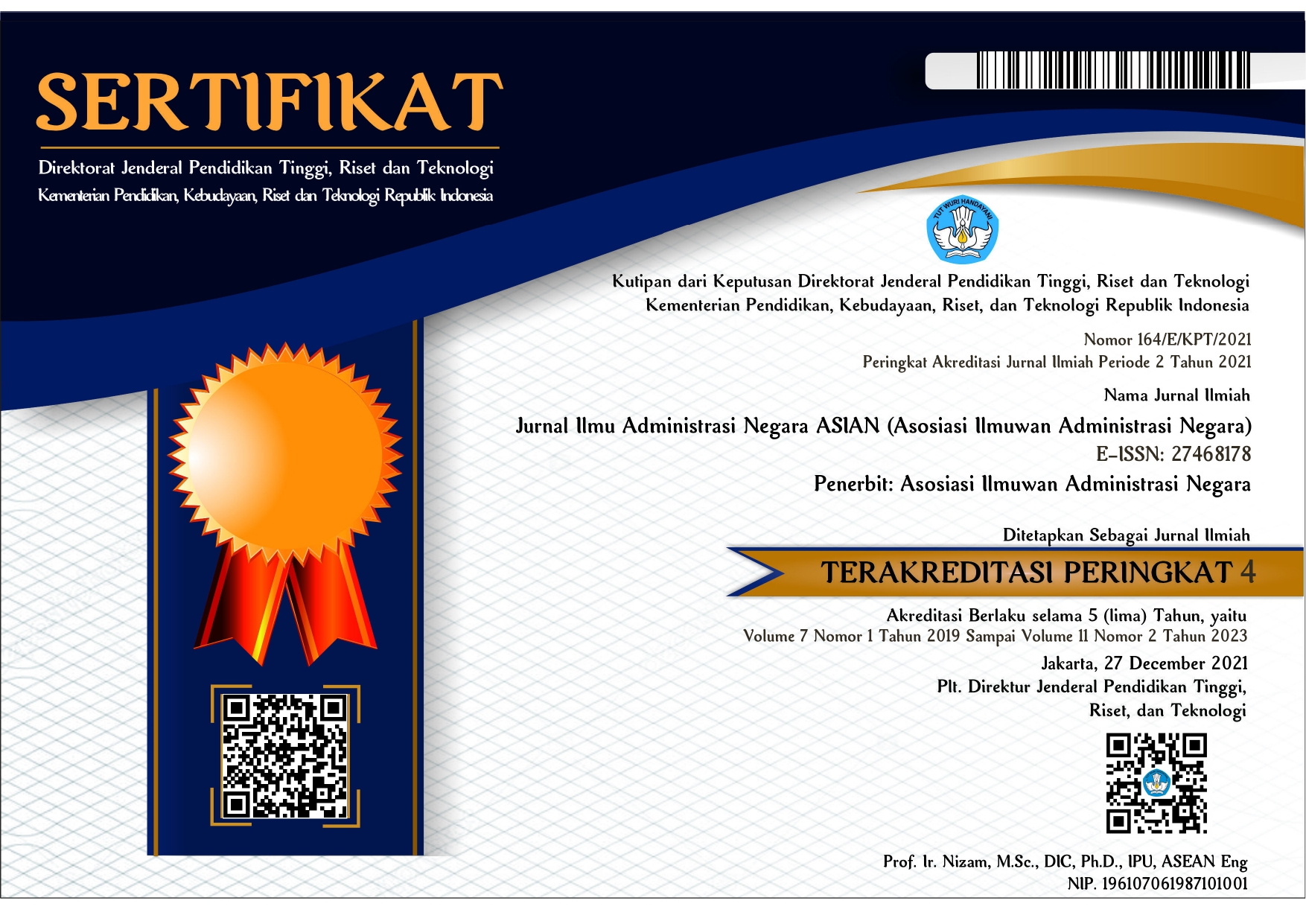Penerapan E-Government Dalam Pelayanan KTP Pada Dinas Kependudukan dan Pencatatan Sipil Kota Padang
 Abstract views: 1183
,
Abstract views: 1183
,
 PDF downloads: 3715
PDF downloads: 3715
Abstract
In life, the role of service is very large, including public service. Every service agency is obliged to improve the quality of service. The poor quality of public services in Indonesia must be immediately addressed by the government. One of the government's efforts to improve the quality of public services is by utilizing advances in information technology in the process of governance. This is known as e-government or the administration of electronic or internet-based government. The process of implementing e-government through several stages, web presence, interaction, transaction and transformation. One way to improve services is to follow the development of more effective information technology. So that it can encourage the government to accelerate e-government, which is an effort to improve electronic-based government services. With the e-government system, it is hoped that every public service agency can provide an increase in the quality of public services that are more transparent, effective and efficient. For online services, the people of Padang City can already access it, but there are still a number of obstacles in its operation. This study aims to determine the application of e-government in making ID cards at the Population and Civil Registration Office of Padang City. This study uses the theory of Nugroho (2007), the stages of development of the implementation of e-government in Indonesia are divided into four and to see the indicators of effectiveness using the theory of Sondang P Siagian. Data collection techniques are interviews, documentation and observation. The research method used is qualitative with descriptive type. The informant selection technique was purposive sampling and tested the validity of the researcher's data by triangulation of sources. The results of the study indicate that public services at the Padang City Population and Civil Registration Service in using the website are still not effective. There are still obstacles in its implementation, which are related to servers and networks that sometimes have problems, besides that socialization needs to be improved so that public and bureaucrats awareness increases in utilizing e-government development in Padang City
Downloads
References
Adejuwon, & David, K. (2012). The Dilemma of Accountability and Good Governance for Improved Public Service Delivery in Nigeria. 25–45.
Arikunto, S. (2013). Manajemen Penelitian. PT Rineka Cipta.
Grindle, Merilee S. (Ed). 1980. Politics and Apolicy Implementation in the Third World, New Jersey: Princetown University Press
Habibullah, A. (2010). Kajian Pemanfaatan dan Pengembangan E-Government. 23(c), 187–195.
Hardiansyah. (2011). Kualitas Pelayanan Publik. Gava Media.
Herabudin. (2016). Studi Kebijakan Pemerintah Dari Filosofi ke Implementasi. Pusaka Setia.
Ilham Arisaputra, M. (2013). Penerapan Prinsip-Prinsip Good Governance Dalam Penyelenggaraan Reforma Agraria Di Indonesia. Yuridika, 28(2), 188–216. https://doi.org/10.20473/ydk.v28i2.1881
Kencana Inu Syafii. 2011. Manajemen Pemerintahan, Bandung: Pustaka Reka
Lalolo Krina P, L. (2003). Indikator & Alat Ukur Prinsip Akuntabilitas, Transparansi & Partisipasi, Sekretariat Good Public Governance Badan Perencanaan Pembangunan Nasional. Pramedia.
Miftah, T. (1999). Ilmu Administrasi Publik Kontemporer. Kencana.
Moenir. 2001. Manajemen Pelayanan Umum Di Indonesia. Jakarta: Bumi Aksara
Moleong J, L. (2002). Metode Penelitian Kualitatif. PT Remaja Rosdakarya.
Nazir, M. Metode Penelitian. Jakarta: Ghalia Indonesia
Nugraha, J. T. (2018). E-Government Dan Pelayanan Publik (Studi Tentang Elemen Sukses Pengembangan E-Government Di Pemerintah Kabupaten Sleman). Jurnal Komunikasi Dan Kajian Media, 2(1), 32–42.
Nugroho, S. (2007). Political Environment dalam Implementasi Electronic Government. Gadjah Mada University Press.
Poltan Litjan Sinambela, dkk 2011. Reformasi Pelayanan Publik Teori, Kebijakan Implementasi Jakarta: Bumi Aksara
Ramadhan, S. (2017). Efektivitas Pelayanan Publik Di Dinas Kependudukan Dan Catatan Sipil Kabupaten Padang Pariaman. In Universitas Sumatera Utara. Universitas Sumatera Utara.
Ratminto & Atik Sw. 2005. Manajemen Pelayanan Umum: Pengembangan Model Konseptual, Citizen’s Charter & SPM. Yogyakarta: Pustaka Pelajar
Sampara Lukman. 2000. Manajemen Kualitas Pelayanan. Jakarta: STIA LAN Press.
Siagian, S. P. (2001). Manajemen Sumber Daya Manusia. Bumi Aksara.
Sugiono. (2012). Memahami Penelitian Kualitatif. Cv. Alfabeta.
Thoha, M. (2003). Birokrasi dan Politik di Indonesia. PT Raja Grafindo Persada.
Copyright (c) 2022 Jurnal Ilmu Administrasi Negara ASIAN (Asosiasi Ilmuwan Administrasi Negara)

This work is licensed under a Creative Commons Attribution-ShareAlike 4.0 International License.
Authors who publish with this journal agree to the following terms:
1. Copyright on any article is retained by the author(s).
2. The author grants the journal, right of first publication with the work simultaneously licensed under a Creative Commons Attribution License that allows others to share the work with an acknowledgment of the work’s authorship and initial publication in this journal.
3. Authors are able to enter into separate, additional contractual arrangements for the non-exclusive distribution of the journal’s published version of the work (e.g., post it to an institutional repository or publish it in a book), with an acknowledgment of its initial publication in this journal.
4. Authors are permitted and encouraged to post their work online (e.g., in institutional repositories or on their website) prior to and during the submission process, as it can lead to productive exchanges, as well as earlier and greater citation of published work.
5. The article and any associated published material is distributed under the Creative Commons Attribution-ShareAlike 4.0 International License








